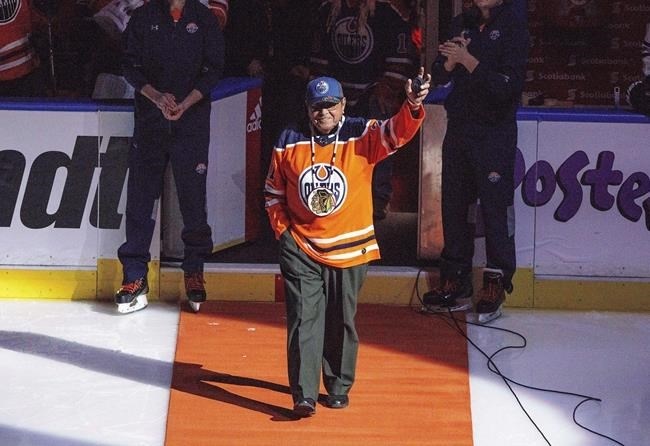
Former Chicago Blackhawk Fred Sasakamoose, one of the first Indigenous pro hockey players, is honoured at the Edmonton Oilers and Chicago Blackhawks game in Edmonton on December 29, 2017.
Image Credit: THE CANADIAN PRESS/Jason Franson
November 24, 2020 - 6:00 PM
Fred Sasakamoose, one of the first Indigenous players in the NHL, has died after battling a presumed case of COVID-19.
Sasakamoose died Tuesday in Prince Albert, Sask. He was 86.
Fred's son, Neil, announced his death in a video posted on Facebook.
Neil Sasakamoose said last week that his father had been hospitalized in Saskatchewan for a presumed case of COVID-19 after experiencing wheezing and chest pains.
"The COVID virus did so much damage into his lungs, he couldn't keep responding," Neil Sasakamoose said in the video.
"I asked him how he's feeling, if he was scared. He said 'I'm not scared. I'm ready to go.'"
"I said 'You know what Dad? If you're tired, you go, and don't worry about us over here.'"
Neil Sasakamoose asked people to "bear down" while COVID-19 remains prevalent.
"Listen to your chiefs, let them do what they have to do, listen to your mayors, your premiers. Listen to the prime minister, listen to the other party, just listen and comply for a while.
"We're going to get a vaccine soon. We're going to get back to normal. I don't get that chance anymore.
"If you have any sincerity towards other people, just keep quite about your talk about anti-masking and all that. I lost a father now. We lose a grandparent and a parent just because of stubbornness and silliness and selfishness."
Sasakamoose played 11 NHL games with the Blackhawks in 1953-54, becoming one of the first Indigenous players in the then-six-team league.
During his time in Chicago, he faced off against greats like Maurice Richard and Gordie Howe.
He also had a storied junior career, playing several seasons with the Moose Jaw Canucks of the Western Canadian Junior Hockey League.
“We are deeply saddened to learn of the passing of Fred Sasakamoose," Hockey Canada said in a tweet. "Fred holds a special place in the history of our great game and it is important to honour his perseverance and character in becoming the first Indigenous Canadian to play in the NHL."
Sasakamoose was one of 11 children, though only five survived childhood. He was forcibly taken from his community in central Saskatchewan to a residential school as a child and told a Truth and Reconciliation Commission hearing in 2012 that he had been sexually abused by other students there.
He also recalled being whipped and having coal oil poured over his head.
While at the school he encountered a reverend, who was convinced he could make Sasakamoose into a big-time hockey player.
"He said to me, 'Freddie, I'm going to make you a champion,'" Sasakamoose recalled in a video released by Hockey Canada in 2017.
Being someone young Indigenous people could look up to was important to Sasakamoose.
"To pave the way for Indian kids and the Metis, they look at you as a role model and they say 'Wow.' They look at my rings and my pictures. This is what I gain in life. This is what brought me to where I am," he said in the video.
"It's for you now to follow in the footsteps — maybe be better."
"RIP to my buddy, Freddy Sasakamoose," Canadian women's hockey player Brigette Lacquette, who is Indigenous, posted on Twitter. "He was a trailblazer, a leader and a survivor.
"He paved the way for so many Indigenous hockey players. My thoughts and prayers to the family. Rest easy, legend."
When his playing career came to an end, Sasakamoose returned to the Ahtahkakoop Cree Nation north of Saskatoon. He became a band councillor and chief, and worked to develop minor hockey and other sports programs across Saskatchewan.
He was named to the Order of Canada in 2017, and given an honorary doctorate of law by the University of Saskatchewan earlier this year.
Due to the COVID-19 pandemic, the convocation ceremony was virtual so Sasakamoose recorded a video message.
"I had a hard time of life," he said. "You want to be somebody, then it takes, you know, a little more effort."
Still, the Indigenous hockey pioneer wanted his story to be heard. His book, "Call Me Indian," is set to come out in April.
"Time will come when I am no longer here," Sasakamoose said in his convocation message. "But my voice you will always use."
This report by The Canadian Press was first publishedNov. 24, 2020.
News from © The Canadian Press, 2020